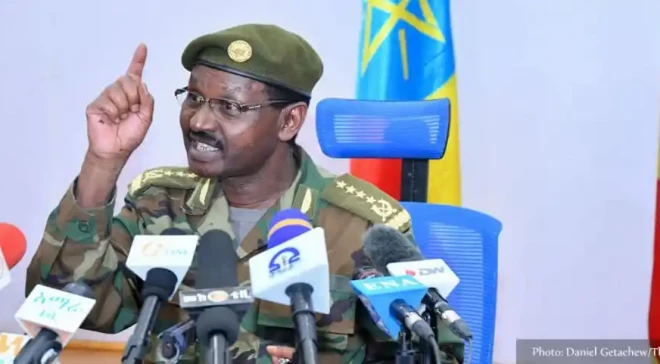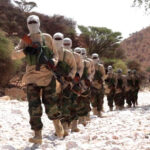ADDIS ABABA — In a candid interview with Ethiopian state television, General Birhanu Jula, Chief of General Staff of the Ethiopian National Defense Force, has once again voiced his criticism towards the Somali government, underscoring its dependency on Ethiopian military support.
General Jula stated, “The Somali military and President Hassan Sheikh do not possess the capability to manage Mogadishu, let alone engage in conflict with Ethiopia. It is the presence of Ethiopian forces that enables the Somali government to maintain control over the capital.”
This statement follows previous comments from General Jula, where he highlighted the extensive role of Ethiopian troops in Somalia, asserting that they control approximately 60% of the country. He warned that without this military presence, the federal government of Somalia would risk losing control over Mogadishu to Al-Shabaab, the militant group that has been a persistent threat to regional stability.
General Jula’s tenure includes multiple deployments to Somalia, where he served in key regions like Bay, Bakool, and Galgaduud between 2010 and 2013. His remarks come amidst heightened tensions, partly fueled by Ethiopia’s recent maritime deal with Somaliland, which has been a point of contention with the Somali federal government led by President Hassan Sheikh Mohamud.
The interview, aired on the Ethiopian National Television (ETV), also touched on the sacrifices made by Ethiopian forces in Somalia, with General Jula noting, “Ethiopia has shed much blood, and many of our soldiers have died in Somalia while combating Al-Shabaab and securing the nation.”
President Hassan Sheikh Mohamud has previously declined to engage in discussions with Ethiopian Prime Minister Abiy Ahmed regarding the maritime agreement, escalating diplomatic tensions between the two nations. General Jula’s comments are seen as a direct response to these diplomatic frictions, emphasizing Ethiopia’s military leverage in Somalia’s internal security dynamics.
This ongoing narrative from General Jula not only reflects the complex military involvement of Ethiopia in Somalia but also underscores the geopolitical sensitivities surrounding Ethiopian forces’ operations beyond their borders.






